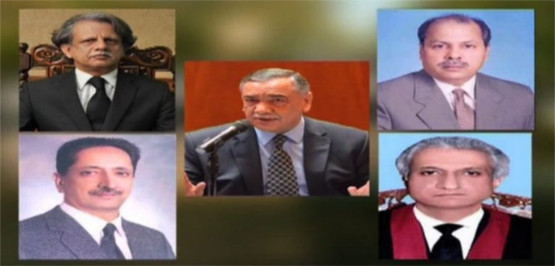An Indian on twitter has requested Pakistanis if they will take all the 22 judges of the Indian Supreme Court in exchange for five Pakistan Supreme Court judges, headed by Justice Asif Saeed Khoosa. He was referring to the same bench that disqualified former Prime Minister Nawaz Sharif in the panama papers corruption case.
Dear Pakistani Friends, Can we have exchange offer please ? You take our 22 Corrupt #SupremeCourt Judges including our CJI Dipak Mishra and give us 5 Judges of your SC bench headed by Justice Asif Saeed Khosa 🙂 #NawazSharif Verdict.
— Madhusudan Thakkar (@madhusudan41) April 13, 2018
Pakistani’s had some witty replies to Mr. Madhusudan Thakkar’s tweet.
Atif Murtaza went far ahead in generosity and offered Nawaz Sharif, Maryam Nawaz Sharif and Bilawal Zardari for free with the judges.
Aapke 5 Upright SC Judges pe 5 Politicians free ? We already have Grandfathers like them in India ☺
— Madhusudan Thakkar (@madhusudan41) April 14, 2018
Mr. Thakar respectfully declined the counter offer saying India already had grandfathers of such politicians and that he was only interested in the upright judges who gave the historic verdict against Nawaz Sharif.
Urooj Fatima however, wasn’t ready to permanently exchange her favourite judges and instead offered if India would be willing to take them for a short period of time and have them returned “after justice is served”.
Qubool Hai ,Qubool Hai, Qubool Hai 🙂
— Madhusudan Thakkar (@madhusudan41) April 15, 2018
Mr. Madhusudan gladly accepted this offer.
Pakistani superior judiciary has taken an activist role as of late and have disqualified a serving prime minister over corruption charges. The judges routinely take suo motto notice on all issues that are of public importance.
The activist role of the judiciary has its critics though. A section of society is against this activist role of the judiciary. The deposed prime minister Nawaz Sharif is at the forefront in criticizing the judges contending that the judiciary is encroaching on the executive powers.
A huge segment of the society however is in favour of the active role of the Pakistani judiciary. The proponents argue that the executive isn’t doing its job which is why the judiciary has to take action under article 184 (3) of the constitution to protect the rights of the citizens of Pakistan.





